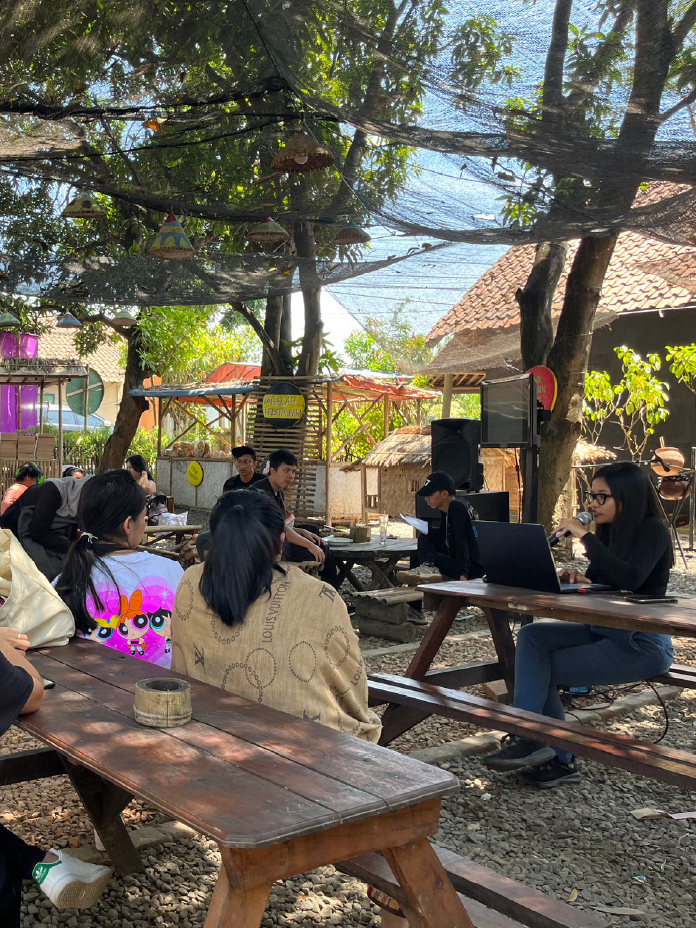Architects don’t have all the answers | Architekti nemajú odpovede na všetko
Pozývame na prednášku našej aktuálnej rezidentky, architektky Yuramie Oksilasari, ktorá pracuje na participačnom projekte mesta Trnava s témou vylúčených komunít na Coburgovej ulici v Trnave.
Prezentácia sa zameria na Yuramiine desaťročné skúsenosti v kontexte juhovýchodnej Ázie, kde pre obmedzené zdroje na spolupráci medzi architektmi a komunitami nearchitektov záleží čoraz viac. Podujatie je určené nielen odborníkom z architektonickej praxe, ale najmä širokej verejnosti, ktorú zaujímajú aktuálne témy v rozvoji a premenách mesta.
- podujatie sa bude konať naživo v kultúrnom centre Malý Berlín
- zároveň bude streamované online na fb.com/MalyBerlin
- prezentácia bude v angličtine bez prekladu
- FOR ENGLISH PLEASE SCROLL DOWN
VIAC O PREDNÁŠKE
Od priemyselnej revolúcie v 18. storočí sa produktivita a efektívnosť neustále považujú za kľúčové ukazovatele udržateľnosti civilizácie. Krajiny, o ktorých sa predpokladalo, že zohrávajú významnú úlohu pri formovaní moderného sveta, zažili rýchly rozvoj a masívnu výstavbu priemyselných budov. Ako sa však menia priemyselné trendy, zmysel týchto budov sa stávajú neistými – niektoré pretrvávajú, iné menia funkciu, mnohé zostávajú opustené. Je iróniou, že okolitá spoločnosť priemyselnej oblasti sa často javí ako najzraniteľnejšia entita v rámci priestoru mestského kontextu.
Podobný jav sa vyskytuje v architektonickom priemysle, kde budovy často symbolizujú udržateľnosť civilizácie a dokonca slúžia ako forma meny. Prevláda myšlienka, že čím viac budov, tým viac bohatstva a prestíže sa v danej krajine nahromadilo. V kontexte nášho zmenšujúceho sa sveta je potrebné kritické uvažovanie. Vynára sa otázka: má táto perspektíva ešte zmysel a dajú sa sociálne problémy naozaj vyriešiť postavením ďalších budov?
V tejto prednáške sa Yuramia Oksilasari podelí o svoje architektonické skúsenosti za posledných desať rokov v kontexte juhovýchodnej Ázie, najmä v Indonézii, kde na spolupráci medzi architektmi a komunitami nearchitektov záleží viac. Tento nápad bude testovaný v rámci participatívneho projektu s rómskou komunitou v priemyselnej zóne na Coburgovej ulici v Trnave.
YURAMIA OKSILASARI
Yuramia Oksilasari je indonézska architektka, výskumníčka a členka Indonézskeho inštitútu architektov. Mnohé jej práce boli ocenené na národnej aj na medzinárodnej úrovni, okrem iného Ministerstvom verejných prác a bývania Indonézskej republiky, Medzinárodným virtuálnym kurzom Institut Teknologi Bandung & The Architectural Association School of Architecture v Londýne, Singapurskou národnou galériou a Architects Regional Council Asia (ARCASIA). Aktuálne je v Malom Berlíne rezidentkou v participačnom projekte mesta Trnava, kde sa venuje téme vylúčených komunít na Coburgovej ulici v Trnave.
We are happy to invite you to a lecture by our current resident, architect Yuramie Oksilasari, who is working on a participatory project of the city of Trnava with the theme of excluded communities on Coburgová street in Trnava.
The presentation will focus on Yuramia’s ten years of experience in the context of Southeast Asia, where limited resources make collaboration between architects and non-architect communities increasingly important. The event is intended not only for experts from architectural practice, but especially for the general public who are interested in current topics in the development and transformations of the city.
- the event will be held live in Malý Berlín cultural center
- the event will also be streamed online at fb.com/MalyBerlin
- free entry
- the presentation will be in English without translation
MORE ON THE TOPIC
Since the Industrial Revolution in the 18th century, productivity and efficiency have been consistently seen as key indicators of the sustainability of civilization. Countries that were thought to play a significant role in shaping the modern world experienced rapid development and massive construction of industrial buildings. However, as industrial trends change, the circumstances of these buildings become uncertain – some persist, others change function, while many remain derelict. Ironically, the surrounding society of an industrial area often appears as the most vulnerable entity within the urban spatial context.
A similar phenomenon occurs in the architecture industry, where buildings often symbolize the sustainability of civilization and even serve as a form of currency. The idea prevails – the more buildings, the more wealth and prestige has accumulated in the given country. A critical examination is required in the context of our shrinking world. The question arises: does this perspective still have meaning and can social problems really be solved by adding more buildings?
In this lecture, Yuramia Oksilasari will share her architectural experiences over the past ten years in the context of Southeast Asia, especially in Indonesia: where cooperation between architects and communities of non-architects matters more. This idea will be tested in a participatory project with the Roma community in the industrial zone on Coburgová street in Trnava.
YURAMIA OKSILASARI
Yuramia Oksilasari is an Indonesian architect, researcher and member of the Indonesian Institute of Architects. Many of her works have been awarded nationally and internationally, including by the Ministry of Public Works and Housing of the Republic of Indonesia, the International Virtual Course of Institut Teknologi Bandung & The Architectural Association School of Architecture in London, the Singapore National Gallery and the Architects Regional Council Asia (ARCASIA). She is currently a resident in Malý Berlín in the participation project of the city of Trnava, where she deals with the topic of excluded communities on Coburgová Street in Trnava.
Za podporu ďakujeme aj mediálnym partnerom: Trnava-live.sk, TrnavskyHlas.sk, Trnavsko a Trnavské rádio.
